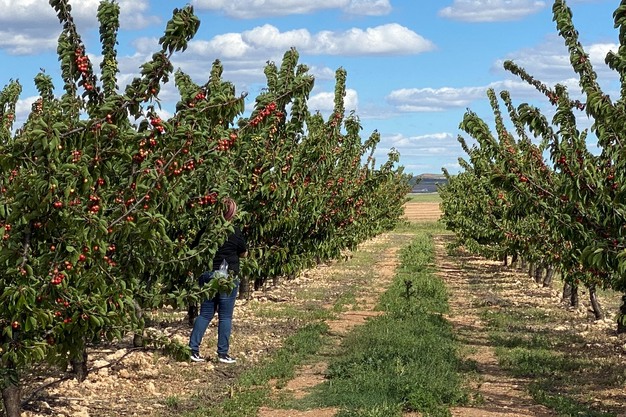The stone fruit season is now well underway in the Spanish region of Aragon, with satisfactory results in terms of production, but room for improvement at a commercial level. The top fruit season is also getting underway. Agustín Sánchez, Manager of AEAMDE and Secretary General of FedeFruta, under which 70% of Aragonese fruit is represented, has offered an analysis of the current situation in the sector, addressing also the 10 year anniversary of the Russian boycott and talking about the main challenges for the present and future.
"For the first time in a long time, after several years, we are facing a stone fruit season in Aragon that could be described as normal," says Agustín Sánchez.

"In previous years, the productions were reduced due to the impact of frosts (2021 and 2022), and a severe drought (in 2023). This year, despite the prospects from March not being reached, volumes have mostly recovered to more acceptable levels (plums are the exception), and they are more in line with production capacity thanks to the limited impact of adverse weather conditions. Also, the varieties have arrived at the right time and there has been no overlapping," he says.
Moreover, according to Agustín Sánchez, "the quality of the fruit has been exceptional and, although the sizes have, in general, been somewhat small (due to ongoing drought), they are also better than last season's."
Commercially speaking, "prices generally stand at acceptable levels, although they could have been better, given that there is not a very abundant production in Europe, especially in France and Italy," says Sánchez. "Spain is recovering some market share this season, and although the year hasn't been bad in general, there have been tough weeks where sales have come to a standstill while waiting for better prices."
In view of the forecasts that volumes this year in Aragon were going to recover, the sector feared facing severe labor shortages, a problem that is becoming increasingly severe for the Aragonese sector.
"It hasn't been easy to find the entire workforce needed, but eventually, except at specific moments in the season, there have been no serious shortages. The months with the highest volume of work in Aragon are June and July, especially during the cherry harvest, and the heat waves have arrived later than and not as frequently as last year, which has allowed a good staggering of the harvests, according to varieties. Also, there has been more contracting at source; up to 5 times more than in 2023, for example, in the province of Huesca," says Agustín Sánchez.
Restructuring of the pear and apple acreage
In late July and early August, the pear and apple harvest started in Aragon and it will continue until November. According to the representative of AEAMDE and Fedefruta, "apple yields will be normal, but the pear production will be lower. It is also worth recalling that in recent years there has been a very significant reduction of both the pear and apple acreage in Aragon. In the case of pears, this has been partly caused by the impact of fire blight and, in both cases, by the low profitability achieved in recent years. This has led many to switch to other more productive varieties and, above all, to other crops, especially stone fruit."

"Since the Russian boycott, we have increased our presence in the EU and opened up new markets"
It is now 10 years since the Russian boycott was imposed. "Losing the Russian market was a heavy blow at the time, but in the last 10 years the sector has shown extraordinary resilience in reconfiguring its markets," says Agustín Sánchez. "When it became clear that the situation was going to continue for a long time, the new peach, flat peach and nectarine plantations that had been planned specifically for Russia had to be uprooted and other species, such as cherries, were planted. Since the supply intended for Russia had to be reoriented to other markets, we saw some significant price drops and faced a lot of uncertainty ahead of the following years. However, the companies were able to turn the situation around, gain ground in other markets and open up new destinations. Since then, shipments to Germany have tripled and we have even increased our presence in France, as well as strengthened our presence in a consistent and sustained way in countries such as Norway and Denmark."
Falling consumption and labor shortages: main handicaps
Agustín Sánchez highlights the lack of laborers and the fall in consumption as the two biggest handicaps for the stone fruit sector.
"Stone fruit consumption in Spain has plummeted from around 14-15 kg per capita more than 20 years ago to less than 3 kg per capita, and this is something the government should be aware of. We thought that the advent of Covid might have reversed this trend, but in 2021 it fell again and consumption continued to fall below pre-pandemic figures. We, of course, need consumption to be better promoted. In a country like Spain, with more than 60 million visitors every year, our campaigns could, for example, target tourists. I think there are many possibilities. In any case, we need to be able to show that we are as competitive in terms of price as other products, for example, dairy products," he says.
"As far as labor is concerned, I think it is essential to secure the harvests for future seasons, because this problem is only going to get worse. I think it is time to bet on mechanization, with field reconversions that will allow it," says the AEAMDE manager.
For more information:
AEAMDE
Association of Agricultural Entrepreneurs on the Right Bank of the Ebro River
Cl. Arrabal, 3, local.
50100 La Almunia de Doña Godina, Zaragoza, Spain
Tel.: +34 976 813 278
gerencia@aeamde.com
www.aeamde.com
